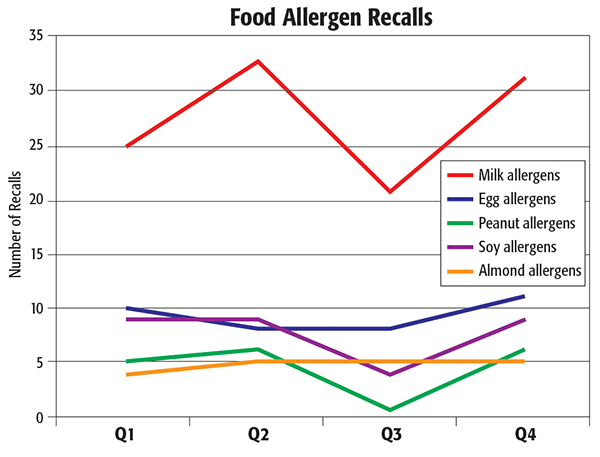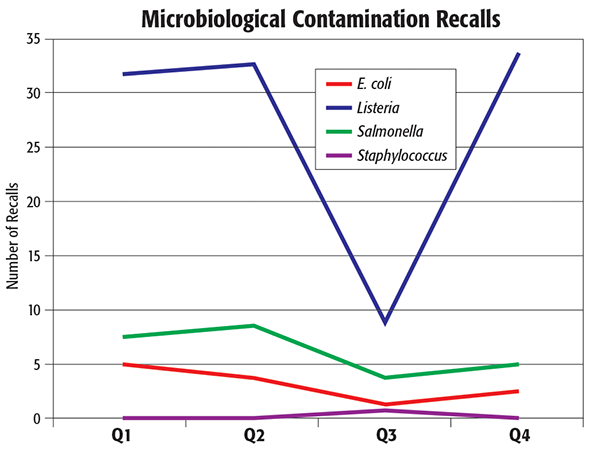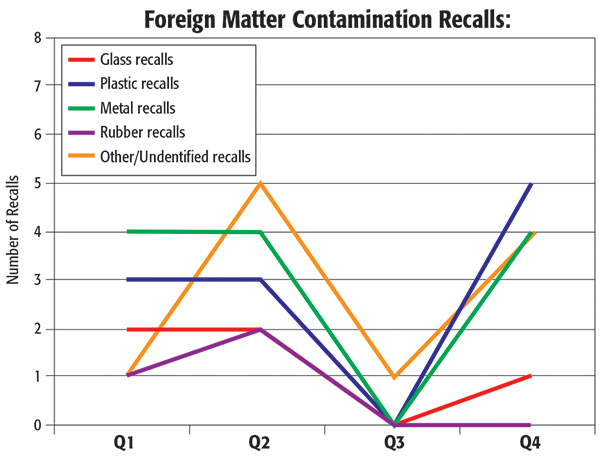For the third consecutive year, Food Safety Magazine has sorted through all of last year’s food recalls to provide an overview of how the food industry is doing. This year, we tallied recalls announced by the U.S. Food and Drug Administration, and the U.S. Department of Agriculture’s Food Safety and Inspection Service. In our 2017 analysis, we did not include recalls announced by the Canadian Food Inspection Agency.
A total of 456 food recalls in the U.S. were recorded for 2017. The numbers can get confusing for a myriad of reasons. Let’s look at a couple of examples.
Let’s say there is a recall of cereal due to foreign material contamination. The cereal came from Manufacturer A and was sent to Retailer A in California. This counts as one single recall. However, later on that recall was expanded to include contaminated cereal that was also sent to Retailer B in Florida. This constitutes a second recall, even though it is for the same product.
Another confusing aspect of these recalls is when one product is recalled for multiple violations. For example, a single product can be recalled for an undeclared allergen and, say, Salmonella contamination. Both of these violations would be tallied as individual recalls.
So, how did food recalls fare in 2017?
Undeclared Allergens
 Nothing has changed. Undeclared allergens still dominate when it comes to food products needing to be pulled from store shelves. Last year, 218 food products posed health risks to unknowing consumers because allergenic ingredients were not properly displayed on product labels. The most prominent undeclared food allergens in 2017 were:
Nothing has changed. Undeclared allergens still dominate when it comes to food products needing to be pulled from store shelves. Last year, 218 food products posed health risks to unknowing consumers because allergenic ingredients were not properly displayed on product labels. The most prominent undeclared food allergens in 2017 were:
- Milk - 110
- Egg - 35
- Soy - 28
- Almond - 19
- Peanut - 18
With the Food Safety Modernization Act underway, a proper allergen control program (ACP) is a must--even if final guidance has yet to be released. Is your food company at risk when it comes to cross-contaminating with allergens? Here are some helpful and timely resources aimed at getting your allergen plan under control once and for all--before the FSMA inspectors come knocking.
Putting Together an Effective Allergen Control Plan
Getting Ready for FSMA's Allergen Guidelines
Meeting the Allergen Challenge
 Listeria
Listeria
Last year saw 108 recalls caused by Listeria contamination. Most of the products recalled in this category were various types of cheese, including an outbreak that claimed two lives. Well-known brands that issued Listeria-related recalls in 2017 include Sargento, Pinnacle Foods (whose recalls in this category affected popular Aunt Jemima and Hungry Man frozen breakfast products).
Salmonella
A total of 24 Salmonella-related recalls were issued in the U.S. last year. The implicated products here are all over the map--candy, potato chips, salami and cappuccino mix, to name a few. Hostess’s Twinkies brand, Tupperware, Hunt’s (a subsidiary of ConAgra Brands), Frito Lay and Goya were among the most familiar brands to recall products due to actual or suspected Salmonella contamination in 2017.
E. coli
Escherichia coli caused 14 recalls in 2017, mostly linked to beef products, including a recall of nearly 80,000 pounds of boneless beef products produced by Waco, TX-based H & B Packing Company.[1] A variety of the company’s beef bins were deemed unsafe after a positive non-O157 Shiga toxin-producing E. coli sample was detected. However, a much larger recall that also involved a multistate outbreak, which we summarize later in this article.
Foreign Material Contamination
 A total of 42 extraneous material recalls were issued in the U.S. last year, with metal and plastic contamination topping the list in this category. Each accounted for 12 and 11 total recalls, respectively. Almost all of these recalls were for various meat products, including one issued by poultry giant Perdue Foods.
A total of 42 extraneous material recalls were issued in the U.S. last year, with metal and plastic contamination topping the list in this category. Each accounted for 12 and 11 total recalls, respectively. Almost all of these recalls were for various meat products, including one issued by poultry giant Perdue Foods.
Some of the “other” foreign material contamination product recalls were the result of a variety of materials including lead, antibiotic nitrofurazone, water, meat casing, a quaternary ammonium compound, styrofoam and aluminum to name a few.
Major Recalls, Outbreaks and More
Botched Breadcrumbs
In June, Tyson Foods, Inc. voluntarily recalled an astonishing 2.4 million pounds of ready-to-eat breaded chicken products.[2, 3] The products may have contained milk--a common food allergen--which was not declared on the product label. Although Tyson was the company that endured the most negative press due to this recall, the problem did not actually originate with the poultry giant. An ingredient supplier had provided Tyson--and a number of other companies including ConAgra Brands, who recalled 700,000 pounds of product--with breadcrumbs that contained the “Big 8” allergen. Including all other food companies affected, a total of 3.7 million lbs. of food was recalled due to the allergenic breadcrumbs. Tyson’s recall was limited to foodservice customers and did not include food products sold in general retail stores. The breadcrumb supplier that was implicated--Newly Weds Foods Inc.--said the presence of undeclared milk was due to a “cross-contact during the manufacturing process” problem and that mislabeling was not the issue. Likely, the problem was the result of one or more employees not following proper procedures. Despite the massive recall, Newly Weds Foods has continued to persevere, announcing on January 31, 2018 the acquisition of Mullins Food Products, a leading sauce supplier in the U.S.[4]
SoyNut Butter Outbreak
SoyNutButter Company--known for its nut-free peanut butter substitute and granola products--was the source of a multistate Escherichia coli O157:H7 bacteria outbreak in early 2017.[5] At least 29 individuals became ill in 12 states. Nine of them developed kidney failure. The products had been distributed to childcare centers and schools in multiple states. Some products were even still available for sale online after the initial recall was publicized. The company voluntarily recalled its I.M. Healthy Original Creamy Soynut Butter products, which later expanded to include all of SoyNut Butter’s products. The products--specifically the contaminated soy paste--were manufactured by Dixie Dew Products, Inc., whose FDA Food Facility Registration was suspended shortly after the outbreak and recall announcement. In an FDA document dated March 3, 2017, inspectors noted a number of violations at Dixie Dew’s Erlanger, KY facility, including bug infestation, malfunctioning temperature control equipment, and food production tools stored in wet, unclean areas.[6, 7] There were also statements from on-site supervisors describing the facility’s history of safety issues that had been ignored for years. For the length of the suspension, no food products are to be distributed or sold from the facility. SoyNut Butter Company filed for Chapter 7 bankruptcy in May 2017.[8]
Vulto Creamery Outbreak
In March, Vulto Creamery recalled a variety of raw milk, artisanal cheeses--distributed nationwide and sold at stores such as Whole Foods Market--due to Listeria contamination.[9, 10] The bacteria was detected as the result of FDA testing. However, it has been reported that in the nearly 2 years leading up to the recall, the owner of Vulto Creamery knew about his facility’s pathogen contamination.[11] Previously documented inspections of the Walton, NY facility showed a series of violations--employees with visible skin abrasions handling food, mold buildup on equipment, and a visible insect infestation. Swab tests conducted between 2014 and 2017 showed that Listeria was present throughout the facility--walls, floors, drains and other surfaces. The resulting multistate Listeria outbreak led to two deaths in Vermont and Connecticut.[12]
Papaya Outbreak
Three farms in Mexico were linked to a Salmonella outbreak caused by contaminated Maradol papayas distributed by four different brands--Caribena, Cavi, Valery and Frutas Selectas. CDC reported that over 250 people in 25 states were infected with various outbreak strains of Salmonella, primarily Thompson, which accounted for more than half (144) of the foodborne illness cases. At least seven other Salmonella strains were also associated with the outbreak, which was initially detected in June 2017 when the CDC notified the FDA about a Salmonella Kiambu cluster detected by PulseNet. Two deaths in California and New York were reportedly linked to this outbreak.[13]
Bat Salad
Although it was not a widespread occurrence, at least two people in Florida reportedly ate from a single package of Fresh Express brand salad sold at Walmart that contained parts of a dead bat inside of the product packaging. Fresh Express issued a recall of other salads made in the same production lot as the contaminated salad in April 2017. The CDC did attempt to test the bat parts for rabies, but it was too deteriorated for officials to say whether the bat tested positive or not.[14, 15] In a statement, CDC did say that the chances of the two people contracting rabies from the salad were low. Fresh Express is a subsidiary of Chiquita Brands, L.L.C.
Golf Ball Hash Browns
In April 2017, McCain Foods USA, Inc. voluntarily recalled some of its Roundy’s brand and Harris Teeter brand frozen hash browns due to reports of “extraneous golf ball materials”. McCain believes that the contamination occurred during the potato harvesting period, where golf balls must have inadvertently made it to the farm.[16]
So what do last year’s food safety recalls and outbreaks tell us? As consumers continue to trust food companies and government agencies to properly vet our food, it is clear that the processes in place do not always go as planned. The persistence of unsafe foods making it into the market should serve as a reminder that for those who work in the food industry, safety is everyone's job. It is not limited to those on the front lines. "Corporate managers, plant managers, quality control, production, cleaning and sanitation, and purchasing departments are all responsible for the development, implementation and upkeep of an ACP."[17] But of course, this sentiment applies to all areas of food safety, not just allergen control--although undeclared allergens do make up the bulk of recalled foods year after year.
While everyone is responsible for making safe food, everyone is also now tasked with staying on top of new and improved legislation in the food safety arena. Just this month, the FDA announced new plans to expedite how they notify the public about food product recalls.[18] There is usually a long process of properly classifying recalls, which can take weeks or even months. Also, FDA takes the time to dig into each problem-causing food, whether it be a suspected outbreak or another hazard. There is a careful process in place to ensure that the public is presented with the most accurate information possible. However, this understandably cautious system has meant that the public is still susceptible to consuming products that are not safe while an official recall notification is on standby. With FDA’s newly announced, faster strategy, it may not reduce the number of recalls announced, but it will certainly be a step forward in terms of keeping consumers safe and even potentially saving lives.
Catch up:
A Look Back at 2015 Food Recalls
A Look Back at 2016 Food Recalls
References
1. https://www.fsis.usda.gov/wps/portal/fsis/topics/recalls-and-public-health-alerts/recall-case-archive/archive/2017/recall-027-2017-release.
2. https://www.fsis.usda.gov/wps/portal/fsis/topics/recalls-and-public-health-alerts/recall-case-archive/archive/2017/recall-067-2017-release.
3. https://www.tysonfoods.com/news/news-releases/2017/6/tyson-foods-voluntarily-recalls-foodservice-chicken-products.
4. https://newlywedsfoods.com/wp-content/uploads/2018/01/NWF-MFP-Trade-Release-LH.pdf.
5. https://www.fda.gov/safety/recalls/ucm545368.htm.
6. https://www.fda.gov/downloads/AboutFDA/CentersOffices/OfficeofGlobalRegulatoryOperationsandPolicy/ORA/ORAElectronicReadingRoom/UCM549352.pdf.
7. http://www.foodsafetynews.com/2017/03/fda-shuts-down-soy-nut-butter-maker-linked-to-e-coli-outbreak/#.WnjgYxNSw_W .
8. https://www.soynutbutter.com/.
9. https://www.fda.gov/safety/recalls/ucm545289.htm .
10. https://www.fda.gov/Safety/Recalls/ucm545716.htm .
11. http://www.foodsafetynews.com/2017/04/fda-report-shows-cheese-maker-knew-of-listeria-in-facility/#.WnCWwhNSw_U.
12. https://www.nytimes.com/2017/03/10/nyregion/two-people-die-after-eating-raw-milk-cheese-made-in-new-york.html .
13. https://www.cdc.gov/salmonella/outbreaks-2017.html .
14. https://www.cdc.gov/media/releases/2017/s0408-animal-material-salad.html.
15. https://www.forbes.com/sites/judystone/2017/04/09/its-bat-time-fresh-express-salad-recall-and-bat-safety-tips/#52c786bf539e.
16. https://www.fda.gov/Safety/Recalls/ucm554452.htm .
17. https://www.food-safety.com/magazine-archive1/december-2003january-2004/writing-and-implementing-an-allergen-control-plan/.
18. https://www.food-safety.com/news/fda-to-expedite-food-recall-notifications/.



